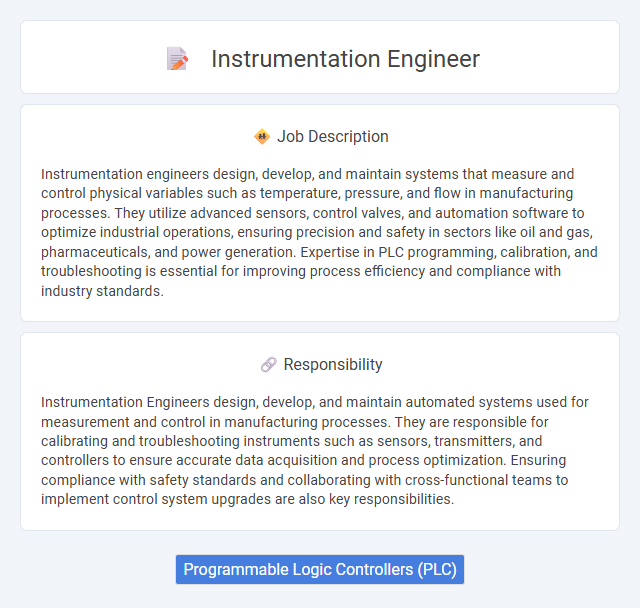
Instrumentation engineers design, develop, and maintain systems that measure and control physical variables such as temperature, pressure, and flow in manufacturing processes. They utilize advanced sensors, control valves, and automation software to optimize industrial operations, ensuring precision and safety in sectors like oil and gas, pharmaceuticals, and power generation. Expertise in PLC programming, calibration, and troubleshooting is essential for improving process efficiency and compliance with industry standards.
Instrumentation Engineer roles likely suit individuals with strong analytical skills and a keen interest in automated systems and control technologies. Those who thrive in environments requiring precision, problem-solving, and teamwork may find the job fulfilling. Candidates lacking attention to detail or struggling with technical challenges might encounter difficulties adapting to this profession.
Qualification
Instrumentation Engineers typically hold a bachelor's degree in instrumentation engineering, electrical engineering, or a related field, ensuring a strong foundation in control systems, sensors, and automation technologies. Professional certifications such as Certified Control Systems Technician (CCST) or Project Management Professional (PMP) enhance expertise and career prospects. Proficiency in software tools like PLC programming, SCADA systems, and industry standards such as ISA and IEC are essential for effective instrumentation design and maintenance.
Responsibility
Instrumentation Engineers design, develop, and maintain automated systems used for measurement and control in manufacturing processes. They are responsible for calibrating and troubleshooting instruments such as sensors, transmitters, and controllers to ensure accurate data acquisition and process optimization. Ensuring compliance with safety standards and collaborating with cross-functional teams to implement control system upgrades are also key responsibilities.
Benefit
An Instrumentation Engineer likely enjoys a competitive salary and strong job security due to the specialized skill set required in industries like oil and gas, manufacturing, and automation. Opportunities for career advancement and professional development may increase with experience and certifications. Benefits frequently include comprehensive health insurance, retirement plans, and potential bonuses tied to project success.
Challenge
Instrumentation Engineer roles likely involve complex problem-solving challenges related to designing, installing, and maintaining control systems and instruments for industrial processes. They probably face difficulties in ensuring system accuracy, reliability, and compliance with safety standards under varying operational conditions. Continuous learning and adaptation to new technologies might be essential to overcome evolving industry demands and technical obstacles.
Career Advancement
Instrumentation Engineers play a critical role in designing, developing, and maintaining automated systems across industries such as oil and gas, manufacturing, and pharmaceuticals. Career advancement opportunities include progressing to roles like Senior Instrumentation Engineer, Project Manager, or Automation Specialist, with higher salaries and increased management responsibilities. Professional certifications such as Certified Control Systems Technician (CCST) and continuous skill development in PLC programming and SCADA systems significantly enhance promotion prospects.
Key Terms
Programmable Logic Controllers (PLC)
Instrumentation Engineers specializing in Programmable Logic Controllers (PLC) design, develop, and maintain automated systems that control industrial processes with high precision. They optimize PLC programming to enhance equipment performance, troubleshoot system faults, and ensure seamless integration with other control hardware and software. Expertise in PLC ladder logic, SCADA interfaces, and industrial communication protocols like Modbus and Profibus is essential for maximizing operational efficiency and safety in manufacturing environments.
 kuljobs.com
kuljobs.com